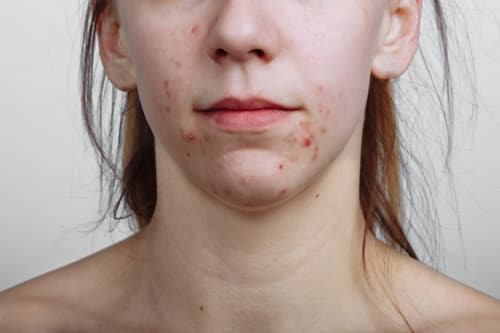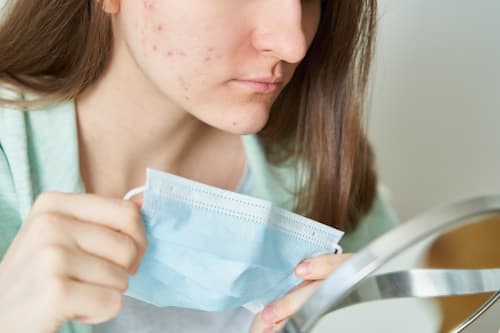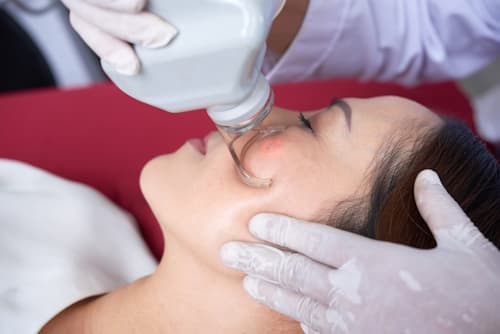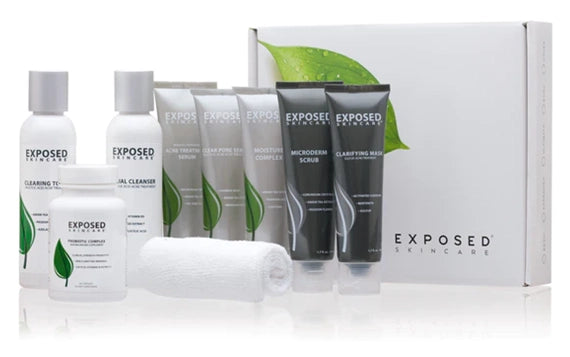When we talk about skin conditions, acne often tops the list. It's a prevalent issue, affecting millions globally. But a question that often surfaces is: "Is acne an infection?"
This query reflects a common curiosity and sometimes a misconception about acne. In this in-depth exploration, we'll unravel the intricacies of acne, its causes, types, and much more, shedding light on whether it qualifies as an infection.
Also read: How to choose the best acne treatment
Biggest Take-Aways:
- Acne is a common skin condition primarily caused by clogged pores due to oil and dead skin cells.
- Effective acne management includes proper skin care, lifestyle adjustments, and sometimes medical treatments.
- While acne is prevalent during puberty, it can affect individuals of any age.
- Exposed Skin Care offers a unique blend of scientific and natural ingredients, proving effective in treating and managing acne.

Understanding Acne: More Than Just Pimples
What Exactly is Acne?
Acne is a skin condition that primarily involves the oil glands at the base of hair follicles. It's most common among teenagers during puberty, courtesy of the hormonal changes that occur. However, acne is not restricted to a particular age group and can affect adults too.
Is Acne an Infection?
At its core, acne is not an infection in the traditional sense. Instead, it's a complex interaction between hormones, sebum (oil), dead skin cells, and sometimes bacteria, leading to inflammation and pimples.
The Anatomy of Acne
The Role of Hair Follicles and Sebaceous Glands
Each hair follicle is associated with a sebaceous gland. These glands secrete an oily substance called sebum, which helps keep our skin hydrated and healthy. However, problems arise when these glands produce too much oil.
The Process of Clogging
The excess oil can mix with dead skin cells, resulting in a clog within the follicle. This clog is the primary culprit in acne formation.
The Bacterial Factor
While acne is not a bacterial infection, bacteria on the skin can play a role. They can exacerbate the clogged pores, contributing to redness and swelling.

Different Faces of Acne
Variety of Acne Types
Acne comes in several types, each with distinct characteristics:
- Blackheads: Open clogged pores.
- Whiteheads: Closed clogged pores.
- Papules: Small, red, tender bumps.
- Pustules: Papules with pus at their tips.
- Nodules: Large, solid, painful lumps beneath the surface.
- Cystic Acne: Painful, pus-filled lumps under the surface of the skin.
Severe Acne and Its Implications
The risk of scarring and skin damage is higher in severe acne cases. Understanding the type of acne is crucial in determining the appropriate course of action.
Causes Behind Acne: A Deeper Dive
Hormonal Changes
Puberty triggers hormonal changes that cause the sebaceous glands to enlarge and produce more sebum. Hormonal changes related to pregnancy and the use of oral contraceptives also can affect sebum production.
Genetics
A family history of acne increases one's likelihood of developing it, suggesting a genetic predisposition.
Diet and Lifestyle Factors
Certain dietary choices and lifestyle factors might trigger or exacerbate acne, although this area requires more research for conclusive evidence.

Medications and Cosmetics
Some medications can provoke acne as a side effect. Similarly, certain cosmetics and skin care products can contribute to clogged pores.
Demystifying Acne Myths
Acne and Skin Hygiene
While keeping the skin clean is vital, acne is not merely a result of poor hygiene. Overwashing can actually irritate the skin and make acne worse.
Diet and Acne
Contrary to popular belief, foods like chocolate and greasy food do not directly cause acne, but diet can play a role in its severity.
Stress and Acne
Stress doesn't directly cause acne but can exacerbate it by triggering hormonal changes.
Acne Treatment: Strategies and Options
- Over-the-counter Solutions: Over-the-counter products containing ingredients like benzoyl peroxide or salicylic acid might be effective for mild acne.
- Prescription Medications: Prescription medications, including oral antibiotics or retinoids, might be necessary for more severe cases.
- Lifestyle Modifications: Simple changes in diet, stress management, and skincare routines can significantly impact the management of acne.
- Advanced Treatments: In some cases, treatments like chemical peels or laser therapy might be advised, especially for stubborn or severe acne.

Managing Acne: Tips and Tricks
- Gentle Cleansing: Clean your skin gently with a mild, non-comedogenic cleanser.
- Avoid Harsh Scrubbing: Scrubbing the skin harshly can aggravate acne.
- Non-comedogenic Products: Use skin products that do not clog pores.
- Mind Your Diet: While diet isn't a direct cause, it can influence acne. Consider a balanced, nutritious diet.
- Stress Management: Find healthy ways to manage stress.
The Journey of Acne
- Acne During Puberty: Puberty is the prime time for acne due to hormonal surges. This is often when individuals first encounter acne problems.
- Adult Acne: A Rising Concern: Adults increasingly face acne challenges, often due to stress, hormonal changes, or other factors.
- The Path to Clear Skin: The journey to clear skin can be challenging, but understanding acne's causes and treatments is the first step toward managing it effectively.
The Benefits of Using Exposed Skin Care for Managing Acne
Managing acne effectively can be challenging, especially for those who get acne due to genetic or environmental factors. Exposed Skin Care has emerged as a notable solution, offering a comprehensive approach to combat acne.
Here's why Exposed Skin Care stands out:
- Targeted Treatment: Exposed Skin Care is specifically formulated to address the multifaceted nature of acne. It works efficiently to treat existing acne and prevent future breakouts.
- Combining Science and Nature: The products combine scientific ingredients known to fight acne with natural extracts, providing a balanced approach to skincare.
- Reducing Inflammation and Redness: The soothing natural ingredients in Exposed Skin Care help to reduce inflammation and redness associated with acne.
- Preventive Care: Regular use can help those whose parents had acne, offering preventive care to those likely to inherit this skin condition.
- Safe for Sensitive Skin: Unlike harsh treatments, Exposed Skin Care is gentle, making it suitable for various skin types, including sensitive skin.
- Reduces Acne Triggers: Keeping the skin clean and balanced helps to reduce factors that can trigger acne, including excess oil and buildup of dead skin cells.
In summary, Exposed Skin Care offers a harmonious blend of scientific and natural elements, making it an effective ally in the fight against acne. While it's not a cure for skin cancer, its skin-friendly formulation can be a part of a holistic skin care regimen that prioritizes skin health and prevention.
Conclusion
Acne, a common skin condition that causes pimples, is a complex issue shaped by various factors. The development of acne, often seen as a hallmark of puberty, involves oil and dead skin cells clogging pores, which may lead to inflamed acne.
Understanding the symptoms and causes of acne is crucial for effective management. It's essential to recognize that while acne is most common during teenage years, it can persist or even start in adulthood.
The goal of acne treatment is multifaceted - to clear your acne, prevent the development of new skin blemishes, and reduce the risk of acne scars. Treatments range from over-the-counter remedies to prescription medications, each targeting different factors for acne.
For instance, products like Exposed Skin Care offer a balanced approach to treating acne, focusing on removing oil and dead skin cells that contribute to acne while soothing the skin.
Successful management of acne may also involve lifestyle changes. Factors such as diet, stress, and skin care routines affect acne and its severity. People with acne must adopt skin care practices that prevent acne and don't further irritate the skin.
FAQs
What Causes Acne?
Clogged hair follicles cause acne due to oil and dead skin cells. Hormonal changes, especially during puberty, and genetic factors also play significant roles.
Can Diet Affect Acne?
While diet alone doesn't cause acne, certain foods may trigger or worsen acne in some people. A balanced diet is recommended for overall skin health.
Is Acne Only a Teenage Problem?
No, acne can occur at any age. Although it is most common during adolescence, many adults experience acne as well.
Can Acne Lead to Scars?
Yes, particularly severe or improperly handled acne can lead to scarring.
What Is Exposed Skin Care and How Does It Help with Acne?
Exposed Skin Care is a treatment system combining scientific and natural ingredients. It helps to clear existing acne, prevent new breakouts, and is gentle on the skin.
















